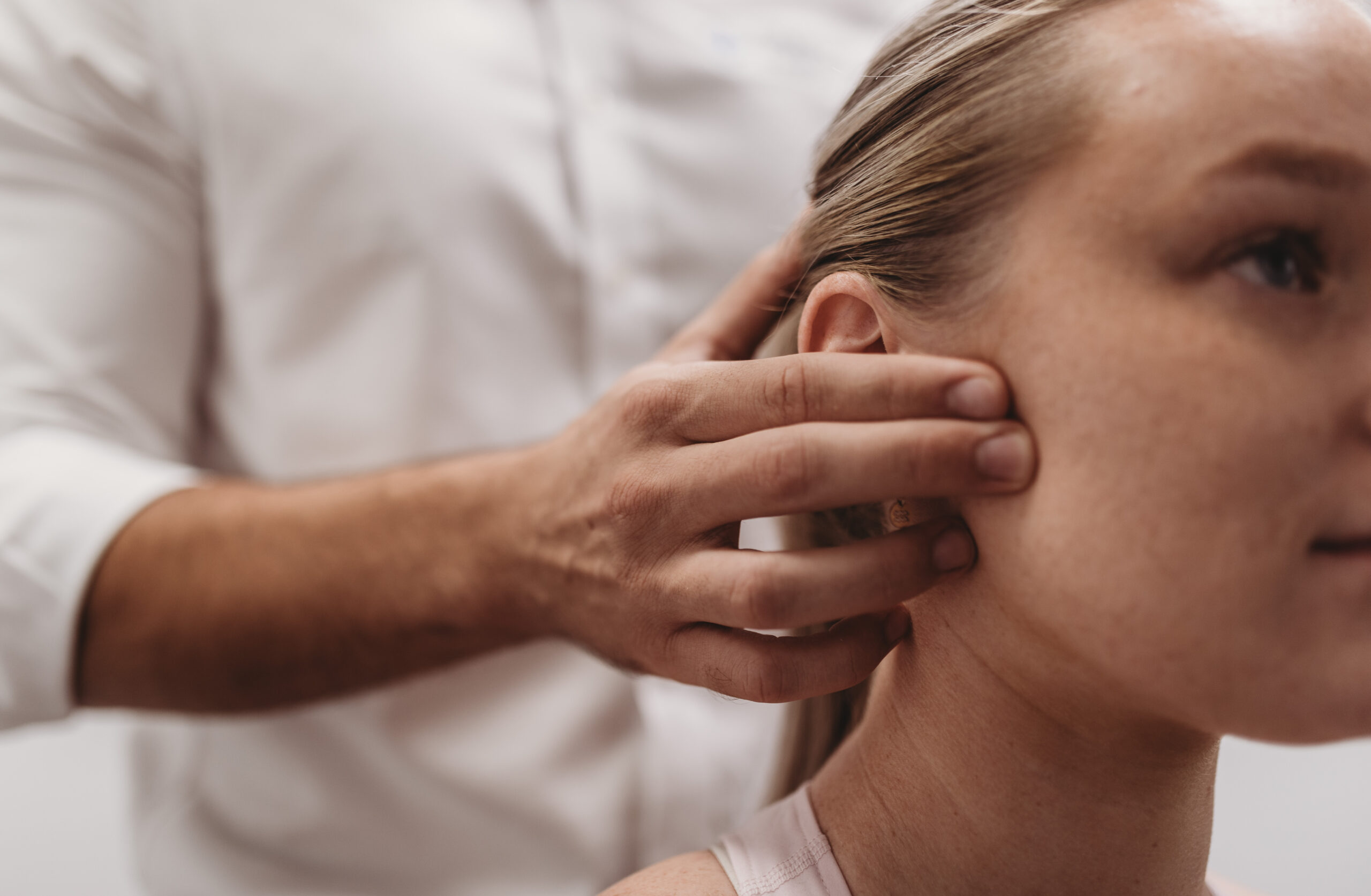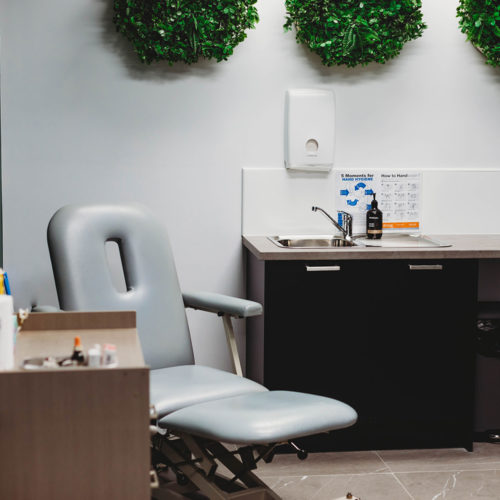Temporomandibular joint (TMJ) dysfunction refers to a range of conditions affecting the jaw joint, leading to symptoms like jaw pain and limited movement. This common disorder can often be effectively managed through physiotherapy.
What is TMJ Dysfunction?
The temporomandibular joint is the hinge joint that connects the jawbone (mandible) to the skull in front of each ear.
Temporomandibular joint (TMJ) dysfunction, also known as temporomandibular joint disorder (TMD), refers to a group of conditions that affect the temporomandibular joint and surrounding muscles, leading to pain and dysfunction in the jaw joint and associated structures.
TMJ dysfunction can manifest in various ways and may involve one or more of the following symptoms:
- Jaw Pain: Pain or tenderness in the jaw joint, which may be localised to one or both sides of the face. The pain may worsen with jaw movement, chewing, or yawning.
- Facial Pain: Pain in the muscles of the face, temples, neck or head, which may be associated with TMJ dysfunction.
- Difficulty or Discomfort with Jaw Movement: Difficulty or discomfort when opening or closing the mouth, chewing, or speaking.
- Clicking or Popping Sounds: Clicking, popping, or grinding noises may occur when moving the jaw, indicating abnormalities in the joint’s structure or function.
- Limited Jaw Movement: Restricted or limited range of motion in the jaw joint, which may affect the ability to open the mouth fully.
- Locking of the Jaw: The jaw may temporarily lock in an open or closed position, making it difficult to move the jaw freely.
- Muscle Stiffness: Stiffness or tightness in the muscles of the jaw, face, or neck, which may contribute to discomfort and restricted movement.
What causes TMJ dysfunction?
- Muscle Tension or Dysfunction: Stress, poor posture, or habits such as teeth grinding (bruxism) can lead to muscle tension or dysfunction in the jaw and surrounding muscles.
- Disc/cartilage Dysfunction: the disc can be displaced or not move as it should resulting in the disc getting stuck and dysfunction occurring.
- Trauma: Injury or trauma to the jaw joint, such as a blow to the face or whiplash injury, can damage the TMJ and surrounding structures.
- Malocclusion: Misalignment of the teeth or jaw (malocclusion) can place excessive stress on the TMJ, leading to dysfunction and pain.
- Arthritis: Conditions such as osteoarthritis or rheumatoid arthritis can affect the TMJ, causing inflammation, pain, and deterioration of the joint.
How Do I Treat TMJ?
Treatment for TMJ dysfunction aims to alleviate pain and restore normal jaw function. It may include:
- Self-care measures: Resting the jaw, applying ice or heat, eating soft foods, and avoiding excessive jaw movement e.g. avoid chewy lollies, chewing gum, foods that require opening your jaw too wide.
- Medications: Pain relievers, muscle relaxants, or anti-inflammatory drugs may help reduce pain and inflammation.
- Physiotherapy: Manual therapy, exercises to improve jaw mobility, stretches, and techniques to relax jaw and neck muscles may be beneficial.
- Dental treatments: Dental interventions such as bite splints, orthodontic treatment, or dental restoration may help correct underlying issues contributing to TMJ dysfunction.
- Stress management: Techniques to reduce stress and muscle tension, such as relaxation techniques or counselling, may be helpful for some individuals.
- Injections: In some cases, corticosteroid injections or injections of botulinum toxin (Botox) into the jaw muscles may provide temporary relief of TMJ pain.
Severe or persistent cases of TMJ dysfunction may require surgical intervention, such as arthroscopic surgery or open-joint surgery, to address structural issues within the TMJ. However, surgery is typically considered only when conservative treatments have been ineffective, and the symptoms significantly impair daily function and quality of life.
Can TMJ Dysfunction be Prevented?
While it may not be possible to prevent all cases of TMJ dysfunction, certain strategies can help reduce the risk or severity of symptoms:
- Maintain Good Posture: Poor posture, especially in the neck and upper back, can contribute to TMJ dysfunction. Maintaining good posture while sitting, standing, and sleeping can help reduce strain on the jaw and surrounding muscles.
- Avoid Excessive Jaw Use: Avoid habits that place excessive stress on the jaw joint and muscles, such as clenching or grinding teeth (bruxism), biting nails, chewing gum excessively, chewy lollies, or biting on hard objects like pen caps or ice cubes.
- Practice Stress Management: Stress can exacerbate muscle tension and jaw clenching, contributing to TMJ dysfunction. Engage in stress-reducing activities such as relaxation techniques, deep breathing exercises, yoga, or meditation to help alleviate tension in the jaw muscles.
- Use Proper Ergonomics: When working at a desk or using electronic devices, ensure proper ergonomics to minimise strain on the neck, shoulders, and jaw. Position computer monitors at eye level, use an ergonomic chair with proper support, and take regular breaks to stretch and relax the muscles.
- Avoid Repetitive Jaw Movements: Limit repetitive jaw movements such as prolonged chewing, yawning excessively, or talking for extended periods without rest. Take breaks and practice gentle jaw exercises to prevent muscle fatigue.
- Protect Your Teeth: If you grind or clench your teeth at night (bruxism), consider wearing a night guard or splint to protect your teeth and alleviate pressure on the jaw joint.
- Maintain Dental Health: Regular dental check-ups can help identify and address issues such as malocclusion (misalignment of the teeth or jaw) that may contribute to TMJ dysfunction. Follow good oral hygiene practices to prevent dental problems that could affect the jaw.
- Avoid Trauma to the Jaw: Take precautions to avoid trauma to the jaw, such as wearing a mouthguard during sports activities that pose a risk of facial injury.
- Stay Hydrated: Dehydration can contribute to muscle tension and stiffness, including in the jaw muscles. Drink plenty of water throughout the day to stay hydrated and promote muscle health.
- Seek Treatment for Jaw Pain: If you experience jaw pain, clicking, popping, or other symptoms of TMJ dysfunction, seek prompt evaluation and treatment from a healthcare professional. Early intervention can help prevent the progression of symptoms and reduce the risk of complications.
By adopting healthy habits and taking preventive measures, individuals can reduce the likelihood of developing TMJ dysfunction or experiencing worsening symptoms. If symptoms arise, early intervention and appropriate treatment can help manage the condition effectively.
Can TMJ Dysfunction Come back?
Yes, TMJ dysfunction can reoccur or “come back” in some individuals, particularly if the underlying contributing factors are not adequately addressed or if there is a return to habits or behaviours that exacerbate jaw problems. Recurrence of TMJ dysfunction may occur for several reasons:
- Incomplete Resolution of Underlying Issues: If the root causes of TMJ dysfunction, such as muscle tension, malocclusion, or stress, are not fully addressed during treatment, symptoms may return or persist.
- Resuming Habits That Exacerbate Symptoms: Certain habits or behaviours, such as teeth clenching, teeth grinding (bruxism), or poor posture, can place excessive stress on the jaw joint and muscles, leading to TMJ dysfunction. If these habits resume after treatment or if preventive measures are not maintained, symptoms may recur.
- Stress and Tension: Stress is a common trigger for TMJ dysfunction, as it can lead to increased muscle tension and jaw clenching. Individuals who experience high levels of stress or anxiety may be more susceptible to recurrent TMJ symptoms.
- Dental Issues: Changes in dental alignment or bite alignment, untreated dental problems, or the development of new dental issues can contribute to TMJ dysfunction recurrence.
- Trauma or Injury: A new injury or trauma to the jaw, face, or neck region can exacerbate TMJ symptoms or trigger a recurrence of TMJ dysfunction.
- Failure to Follow Treatment Recommendations: If individuals do not adhere to their treatment plan or fail to follow recommendations for self-care, physiotherapy exercises, or lifestyle modifications, they may be at higher risk of TMJ dysfunction recurrence.
- Underlying Medical Conditions: Certain medical conditions, such as arthritis or connective tissue disorders, can predispose individuals to TMJ dysfunction. If these conditions are not effectively managed, TMJ symptoms may return.
It’s essential for individuals with a history of TMJ dysfunction to continue practising good oral hygiene, maintaining proper posture, managing stress levels, and seeking prompt treatment for any new or recurrent symptoms. Additionally, regular dental check-ups and evaluations by a healthcare professional can help monitor for any signs of recurrence and address underlying issues promptly.












